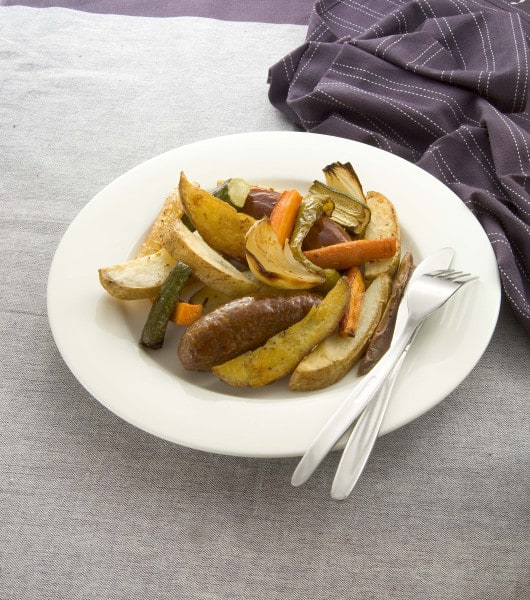Are potatoes healthy? The poor potato has had a bit of a hard time lately. A lot of people have let the potato take a back seat in their diet, swapping it for kumara or cutting it out of their diets completely. I’m quite often asked “Are potatoes healthy?” While nutritionally, a kumara does have more nutritional value, the potato is nothing to scoff at.
It’s time to take a look at the potato and start loving it again. And with new season potatoes out now, there’s never been a better time to enjoy the potato.
Nutritionally, the potato is far better with the skin on as lots of it’s nutrients and antioxidants are stored here. The skin also provides fibre.
The potato is a source of a range of essential nutrients:
Potassium
Potatoes are one of the best vegetable sources of potatoes. Potassium is found in every cell of the body. It, along with sodium, help regulate fluid flow in and out of our cells. This affects our blood pressure. While sodium tends to be abundant in the modern diet, potassium is less so. Eating plenty of vegetables and some fruit is the best way to keep your potassium intake high.
B Vitamins
Potatoes are a source of the following B Vitamins:
Thiamin (vitamin B1)
150g of potato supplies up to 10% RDI of Thiamin.
Our bodies need thiamin for carbohydrate metabolism and normal neurological and cardiac function.
Thiamin contributes to:
*nerve and muscle functioning
*energy production
*psychological function.
Niacin (vitamin B3)
Potates are a good source of niacin and supply up to 25% RDI in a 150g serve.
Niacin (vitamin B3) is necessary for:
* normal neurological function
* energy release from food
* structure and function of skin and mucous membranes.
Pantothenic acid (Vitamin B5)
A 150g serve of potato will give you 10% of your intake of pantothenic acid.
Pantothenic acid is necessary for normal fat metabolism and contributes to:
* growth and development in children
* energy production
* normal mental performance
*synthesis and metabolism of some sex and stress related hormones, vitamin D
*synthesis and metabolism of some neurotransmitters
Folate (vitamin B9)
Potatoes are a source of folate and supply 11-17% of the RDI in a 150g serve. Folate is necessary for normal blood formation and cell division. Therefore, adequate folate is important for a huge range of functions within our body. Folate is important for pregnant women too, as a low folate intake is related to neural tube defects like spina bifida (supplementation is recommended one month before and during pregnancy, but it’s also important to eat a diet that contains folate rich foods).
Vitamin C
We often think about fruit as being the main source of vitamin C, but potatoes provide a good source as well. A 150g serve of potato provides 12.2g of vitamin C which is 30% of the recommended daily intake.
A bit about glycemic index:
Potatoes fall in the moderate to high category of the glycemic index, depending on the variety. This means the carbohydrate is digested quickly. For some this has been a reason to avoid them. However, because potato is a wholefood, it provides a source of vitamins, minerals and antioxidants. Also potatoes are generally eaten alongside other foods such as meat and vegetables. When consumed in a mixed meal, the glycemic index changes as it’s not just one food that’s eaten, it’s a range of nutrients. So in a mixed meal, the effect on blood sugars isn’t likely to be as rapid.
Also, cooked potatoes that have been cooled have a lower glycemic index as when they cool. This is because some of the starch is converted into resistant starch. Resistant starch is not digested, therefore the total carbohydrate intake of the potato is reduced and it also lowers the glycemic index by slowing digestion.
So, are potatoes healthy? As you can probably guess, yes, they are.
My favourite ways to eat potato:
The potato is so versatile. In summer, freshly boiled new potatoes are delicious with olive oil and fresh herbs. I love baked potato too. Another way to enjoy potato is in these delicious potato, cauliflower and cheese fritters.
What’s your favourite way to enjoy potato?
References:
2.University of Sydney GI database
Images 1 and 2 from vegetables.co.nz




We hadn’t been eating potato for a while because Kumara has been cheap and we prefer the taste of kumara but kumara is starting to go back up in price so the past couple of weeks we have been starting to have potato again! I like them just roasted, we sometimes roast a bit batch of vegetables on the weekend so we have enough to last a few days so we don’t need to cook them during the week.
I Love love love potatoes. They are so versatile and just so yummy.
Interesting to hear its lower GI when cold.. love it.
Great article, thank you 🙂
No worries Eszter, happy you found it useful 🙂